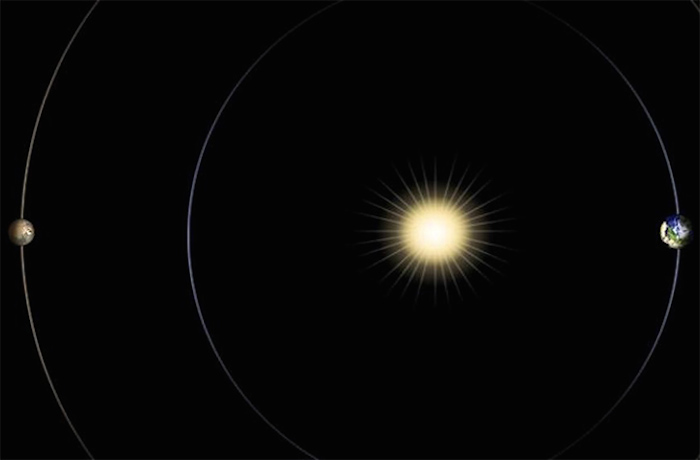.

This diagram illustrates the positions of Mars, Earth and the sun during a period that occurs approximately every 26 months, when Mars passes almost directly behind the sun from Earth's perspective.
.
The Earth and Mars will be on opposite sides of the sun this month, meaning we’ll lose contact with our beloved Mars rovers and orbiters.
Every 26 months or so, a Mars solar conjunction occurs and mission controllers for all of our Mars robots need to make special arrangements for an interruption in service.
From June 7 to June 21, NASA will avoid sending commands to any of their robotic Mars assets, including Mars rovers Curiosity and Opportunity plus the three orbiters, Mars Reconnaissance Orbiter, Mars Odyssey and MAVEN. As Mars approaches opposition to within 2 degrees of the sun as viewed from Earth, to avoid any radio interference, no commands will be sent.
“Our overall approach is based on what we did for the solar conjunction two years ago, which worked well,” said systems engineer Nagin Cox, at NASA’s Jet Propulsion Laboratory, Pasadena, Calif. “It is really helpful to have been through this before.” Nagin is leading the conjunction planning for NASA’s Curiosity Mars rover.
“The data will be stored and transmitted back to us after communications are reestablished at the end of the solar conjunction period,” said MAVEN deputy project manager James Morrissey at NASA’s Goddard Space Flight Center, Greenbelt, Md. This will be MAVEN’s first conjunction since arriving in Mars orbit last September.
Mars Odyssey and the MRO will continue to transmit science data to Earth during the conjunction, but much of the data will be lost, so backups will be made and re-transmitted after the communications blackout. Curiosity and Opportunity will send limited data to the orbiters during that time, backups also being made.
For the Mars Odyssey orbiter, which reached Mars in 2001, this will be its 7th conjunction. For Opportunity, which landed on the Red Planet in 2004, this will be its 6th. And for the MRO, this will be its 5th.
For all NASA missions except Opportunity, mission controllers have been busily clearing science data from their memories to optimize storage of science data during conjunction. For Opportunity, however, mission controllers will not store any conjunction data on the robot’s flash drive — its memory that would allow overnight storage of data. Instead, the veteran rover will send daily science data up to the orbiters overhead where the telemetry will be stored.
Opportunity has suffered bouts of amnesia linked to a corrupt flash drive bank for some time, so NASA has decided that the rover will only use its volatile memory (which is wiped every day) for science operations.
The European Space Agency’s Mars Express and the Indian Space Research Organization’s Mars Orbiter Mission satellites will also likely carry out a similar strategy of communications suspension.
Quelle: D-News
3978 Views
